To read this post in the context of my blog and/or sign up to be notified for future posts, please click here.
As a practicing physician, it is always interesting to capture the pulse of what cancer patients, at least my cancer patients (95% of whom are dealing with prostate cancer), are finding in what Rush Limbaugh would call the “drive by media”. I would love to go on and make political comments about Rush, but will stay away from that one! For the past two weeks, the questions have all been about the story that a patient was cured by the measles virus. This is a story published online from investigators at the Mayo Clinic. In casting about for the background to the story, I could not possibly improve on this article which puts the findings in context: Could measles cure cancer? Uh, not exactly… If you want to know the details about that particular newsworthy story, click and read it for yourself. (Parenthetically, Cancer Research UK’s website seems remarkably well designed and useful for promoting cancer clinical trials that move the ball forward for prostate and other cancers.)
This post is meant to help you do a little background research for yourself. The news media loves to write articles that attract attention to hopeful cancer research breakthroughs. Next weekend, the ASCO annual meeting will give them a remarkable amount of grist for writing articles. If you search for prostate, you will find that there are forty pages of abstracts to read through, describing the ongoing research. The presentation I am most looking forward to is Chris Sweeney’s presentation on the results from a large phase III clinical trial that evaluated the use of docetaxel “up front” in patients starting ADT. This will be a plenary session presentation, but we already know that the trial was stopped early because patients who received the chemotherapy in addition to hormonal treatment alone seem to live longer. The question/answer session for this should be interesting. Is the toxicity worth it? Was there balance in the number of patients who received any of the newer second line hormonal treatments? How many patients received a vaccine?
In general, when you see news articles and want to dig just a bit deeper, my favorite method is to go to Google Scholar. In the case of the measles virus stories, use “Scholar” to hunt for this search term: “measles virus cancer”. It will take you to this page, where sure enough, people ARE working on using measles virus to treat prostate cancer. Otherwise, try to find the meeting where the “new breakthrough” the news writer is discussing was published, and look at the abstract for yourself. People like to write and read about promising cancer research. But, as we all know, it is a very long way from mouse to man, and the clinical trials take a long time to complete, especially in a slowly moving disease like prostate cancer. Remember that large phase III clinical trials are the ones that change practice and become widely available, whereas phase I and phase II trials are often available only at some locations and the drugs discussed may never make it to the clinic. Not the kind of thing you want to hear if your own disease has become more aggressive, but it is great that so much prostate cancer research is going on to help the next generations. It is a vastly different landscape than 30 years ago when it seemed that all of the exciting progress was in lymphoma and breast cancer. And as I predicted almost 20 years ago, patients and their families now have as much information as the doctors caring for them.




I am curious what treatment options you believe have the best curative rates with the lowest side effect/ quality of life profile. For example a 60 yo, Gleason 3+4 no progression of cancer based on pelvic MR. Bone and CT scan negative. PSA 14
I think surgery or radiation therapy have roughly similar cure rates. The side effects are a bit different. Most patients are happy with their choice after making it as indicated in this article: Sanda, Martin G., et al. “Quality of life and satisfaction with outcome among prostate-cancer survivors.” New England Journal of Medicine 358.12 (2008): 1250-1261.
Thanks good article
Will start using Scholar at Google…